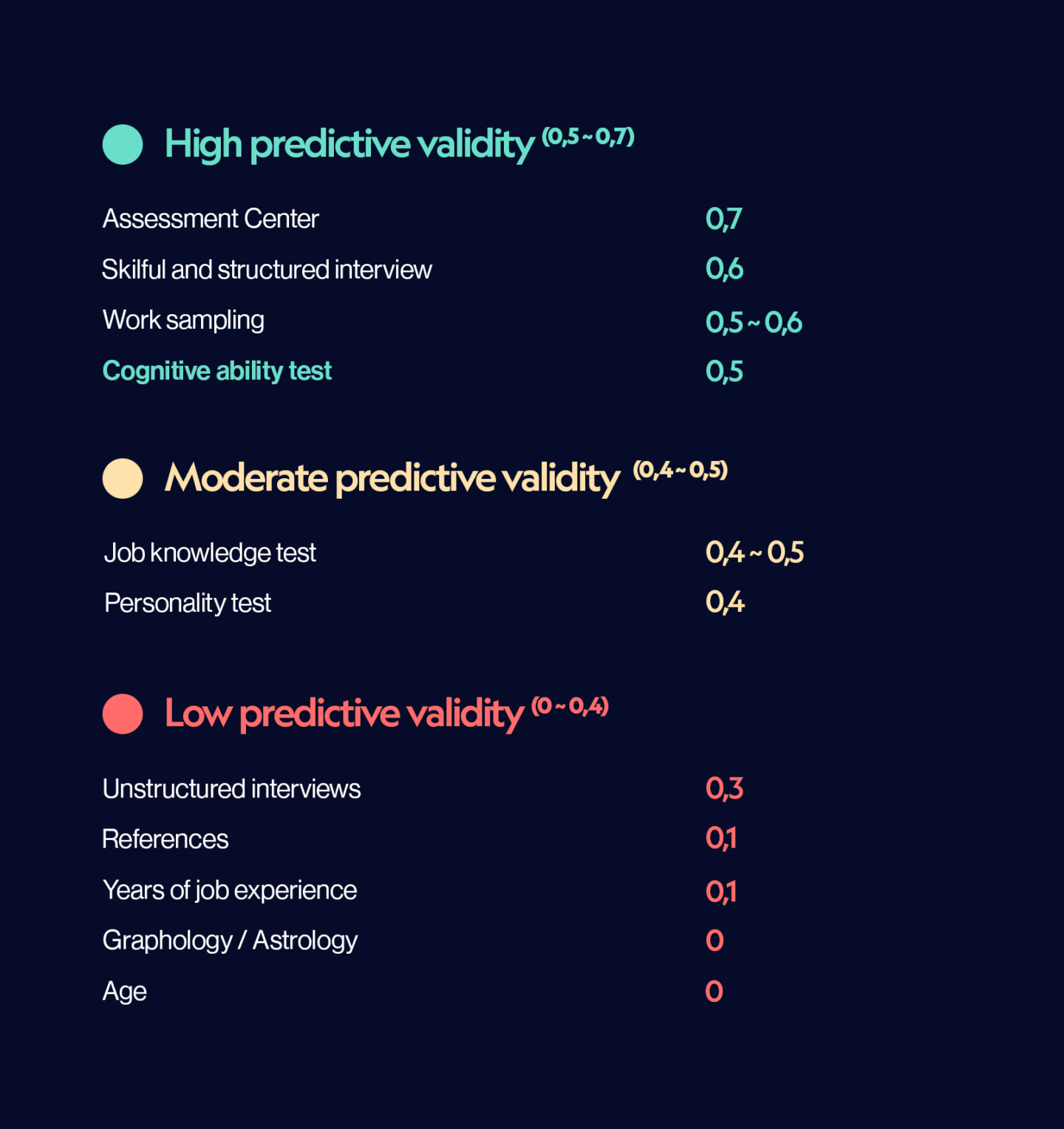Why use cognitive tests in recruitment?
Work is becoming increasingly complex. We are being asked to know how to do everything, how to adapt, how to code, how to market and how to communicate. Against this backdrop, recruiters need more than ever to assess candidates' potential, measure their ability to succeed in a changing environment and solve complex problems. Cognitive tests, based on the evaluation of cognitive functions (logic, memory, reasoning, etc.) can provide recruiters with invaluable data to help them select the candidates best suited to their needs.
History and definition of cognitive tests
Cognitive tests date back more than a century. One of the pioneers in this field was French psychologist Alfred Binet, who developed the first intelligence tests to assess children's intellectual abilities. This early work led to the creation of a variety of cognitive tests, aimed at measuring specific functions such as memory, attention, perception and reasoning.
Defined as tools for measuring specific mental abilities, cognitive tests can include verbal, numerical or spatial assessments. In recruitment, these tests are used to predict a candidate's ability to adapt, solve problems and process complex information quickly. Their ability to provide an objective assessment makes them an essential asset for HR in their selection processes.
The predictive power of cognitive tests
Cognitive tests are among the most reliable predictors of future job performance, outperforming many other assessment tools. Research consistently shows their strong predictive validity, with correlation coefficients ranging from 0.50 to 0.51 - though more recent meta-analyses, such as Sackett et al. (2022), suggest a slightly lower estimate of 0.31. This means that cognitive skills have a high and direct link with success in a given job, particularly in terms of the ability to adapt to new tasks and solve complex problems. This level of accuracy is superior to many other assessment methods, such as structured interviews or personality tests.
By using these tests and combining them with recruitment interviews, recruiters can better identify candidates with the potential to evolve and adapt to dynamic work environments.

The benefits of cognitive testing HR professionals
Integrating a cognitive assessment into a recruitment process has a number of significant advantages for human resources professionals:
- Performance prediction: As mentioned, these recruitment tests are strongly correlated with professional performance, particularly in roles requiring problem-solving and rapid learning.
- Objective, standardised assessment: Cognitive tests provide a standardised assessment of intellectual ability, eliminating the subjective biases that can arise during conventional interviews.
- Versatility: They can be used for a wide range of roles, whether technical, analytical or even creative.
- Comparison: Cognitive assessments make it possible to compare candidates objectively, eliminating potential cognitive biases on the part of recruiters, who could be influenced by the candidate's appearance, self-confidence or even reputation.
The limits and risks of cognitive tests
Although cognitive tests are extremely powerful, they also have certain limitations that recruiters should bear in mind:
- Incomplete assessment: Cognitive tests focus on mental abilities, but they do not take into account interpersonal skills and soft skills, which are just as crucial to success in many jobs. It is therefore important to supplement these tests with interviews and behavioural assessments.
- Cultural bias: Some tests can disadvantage candidates from different cultures or backgrounds, as they are often based on specific cultural norms. It is therefore essential to choose tests that are suitable for a diverse population.
- Test anxiety: Taking cognitive exercises can cause stress in some candidates, negatively impacting their performance and distorting the results. To limit this effect, recruiters can share advice and good practice with candidates beforehand to demystify the exercise.
The best cognitive tests
This list is intended to help you compare the different cognitive tests available. Although it is not exhaustive, it is essential to remember that these tests are not always directly comparable because of the diversity of the items they assess.
For example, it makes no sense to compare a test that measures only verbal reasoning with one that assesses numerical reasoning. What counts above all is choosing the test that is best suited to your specific needs and professional context.
-
01.
TwoB-R
A cognitive-behavioural approach to assessing a candidate's cognitive resources and behavioural skills.
-
02.
Mindkeys
A test with gamified cognitive exercises to assess memory, attention, problem-solving, critical thinking and other key cognitive functions.
-
03.
CCAT
The Criteria Cognitive Aptitude Test measures your ability to solve problems, use new information and think critically.
-
04.
Cognify
A fun assessment of cognitive skills that measures problem-solving, critical thinking and numerical reasoning.
-
05.
DESIGMA-Advanced
A non-verbal assessment test that evaluates overall cognitive performance through logical and deductive reasoning.
-
06.
Logiks
A test that sheds light on general, verbal, numerical and abstract reasoning skills.
-
07.
RAVEN'S™ APM III
To assess candidates' intellectual and learning potential.
Cognitive tests offer HR professionals an effective and scientifically validated method of predicting job performance and identifying high-potential talent. Although they cannot provide a complete picture of the candidate, they are a powerful tool when used in conjunction with other assessment methods. By maximising the use of cognitive tests and taking into account their limitations, recruiters can make more informed decisions and optimise the success of their future employees.
Newsletter
Thank you for subscribing to our newsletter!
You’ll now receive our articles, be informed of our events and benefit from our white papers.
Ready to discover your next talents?
Complete the form to get a demo with one of our experts
Footer form
Thank you!
Your info was submitted successfully.